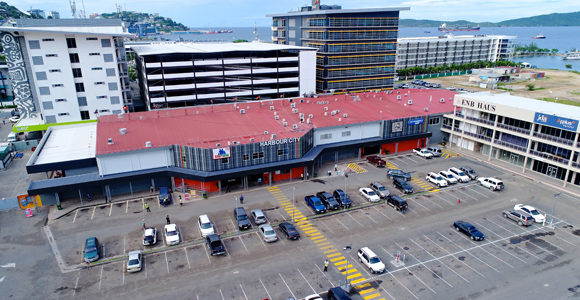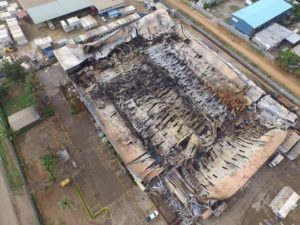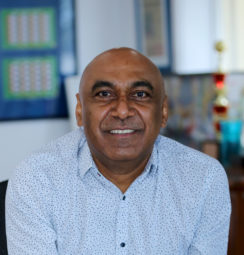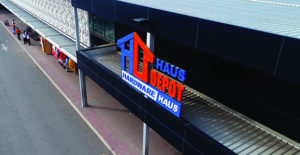Rising, quite literally, from the ashes of a devastating fire in 2017, retailer CPL Group is back in the black. However, CEO Mahesh Patel tells Business Advantage PNG that rogue retailers and slow government spending have presented challenges to the retailer’s phoenix story.

CPL’s flagship Stop N Shop Harbour City. Source: CPL/Media Haus
CPL Group CEO Mahesh Patel tells Business Advantage PNG that the group is spending big on a new K45 million distribution centre in Port Moresby that will provide a 50 per cent boost in capacity and offer a range of business efficiencies.
There will be savings in labour, fuel and transportation costs as the company consolidates numerous smaller warehouses, he says. There will also be more opportunities for bulk buying when the facility becomes available in mid-2020.
Patel says the company, which includes the City Pharmacy chain and Stop N Shop supermarkets, is battling a rising tide of unlicensed retailers that are threatening the company’s market share, the major avenue of growth for the group.

A 2017 fire destroyed CPL’s head office and main warehouse. Source: CPL
‘The biggest challenge we’ve got is what we call unregulated retailers – that’s becoming huge,’ says Patel. ‘If you talk to any of the established businesses, the biggest complaint is that it’s an unfair playing field. How do you compete with them? You can’t because we’ve got a set infrastructure, we’ve got a set number of people, we play by the rules, we pay people award rates and we spend money on training.’
These unlicensed operators are undercutting CPL on foreign imports and have far less overheads, says Patel.
‘If it’s a level playing field, I’ve got no issues, but we don’t believe it is.’
Response

CPL Group’s Mahesh Patel
CPL is responding to the challenge head on by expanding the range of products it offers in its stores.
‘We’re adding more and more range. We need to give the consumer that extra choice and it becomes a differentiator as well.’
For example, he says Stop N Shop now stocks twenty different cuts of local Ramu Beef.
‘That’s a strategy to move away from those rogue retailers who are selling the basic staples. Our big focus will be selling fresh meat, produce and bakery – that’s going to be our differentiator.’
Featuring more local produce is also key.
‘We keep growing our local product lines and cutting back on the imports. We’re encouraging farmers to grow more and more. We’ve got an extension officer now and she goes out teaching quality assurance to farmers,’ he tells Business Advantage PNG.
Slow payments
Another challenge facing CPL’s cashflow is reduced government expenditure, and slow payments. While government business accounts for only about 4 per cent of CPL sales overall, it is the effect of money flowing through the economy that bites the retail sector.
‘Cash is going to be the absolute king next year’
‘It’s an indirect effect where [Government] don’t pay contractors, contractors don’t have money, and they don’t shop with us,’ Patel explains. ‘So it’s a dribble-down effect. We had a fairly aggressive growth planned for this year coming out of the fire, and the first quarter we were getting high double-digit growth. In May, just when the Government changed, something clicked and we just don’t know what. In May, we went down to single-digit growth.’
‘CPI is around five or six percent, so we need that growth at least.’
These single digits continued through to October making it a tougher-than-expected climate for Papua New Guinea’s largest retailer who now has all eyes on the Christmas season that usually offers a 40 per cent spike in sales.
Shining stars

‘Shining star’ – Hardware Haus. Source: CPL/Media Haus
On a positive note, Patel says that its Hardware Haus business has turned from a challenge two years ago to the group’s ‘shining star’ while clothing store chain Jack’s of PNG is also proving profitable.
Another brand, Prouds Duty Free – a joint venture with Fiji’s Motibhai Group of Companies – has just opened a new store in Port Moresby’s Vision City Mega Mall in time for Christmas.
But Patel says further expansion remains on hold until the savings from the new distribution centre start to come through. Nevertheless, he has no regrets about making such a big investment in CPL’s future.
‘We had to do it,’ he says. ‘If I had my time again, I would still build it because it was an absolute necessity. But it’s going to eat into our cashflow, so cash is going to be the absolute king next year.’








Speak Your Mind